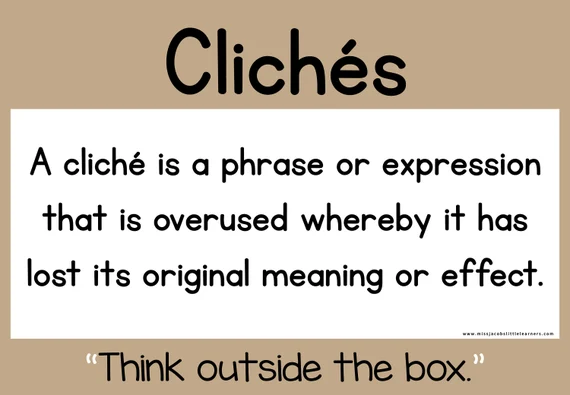
In the Dutch laguage a cliché in this context is labeled as ‘dooddoener’
Een dooddoener (of machtspreuk) is een nietszeggend argument dat een gesprek van het onderwerp afbrengt, waardoor een verdere gedachtewisseling wordt afgesneden, het dood doet slaan.
The English translation of the Dutch text is
A cliché (or power phrase) is a meaningless argument that steers a conversation away from its subject, cutting off further exchange of thoughts, effectively killing it.
Something that people have said or done so much that it has become boring or has no real meaning.
Cambridge Dictionary
A thought-terminating cliché is a form of loaded language, commonly used to quell cognitive dissonance.
(also known as a semantic stop-sign, a thought-stopper, bumper sticker logic, or cliché thinking)
It’s all too common for something to occur that really shouldn’t have and,
truth be told, couldn’t have happened.
Take the instances outlined in point G. and earlier points, on the home page, for example.
What tends to happen is that the gravity of the situation gets downplayed by labeling it as an exception.
——–
Yet, when there’s a consistent pattern of carelessness, repeated errors, or a failure to take responsibility,
resulting in things going awry, escalating into a direct catastrophe or a personal ordeal,
in those moments, as humans, we can’t just wash our hands of it like Pilate.
We can’t brush it off as an exception. If someone does, they’re falling back on a tired cliché.
Zo vaak gebeurt het, dat iets wat niet had mogen gebeuren en
zelfs niet had kunnen gebeuren,
zoals de voorbeelden in punt G. en voorgaande punten, op de home pagina,
men de ernst van het voorval wil minimaliseren, door het voor te stellen als een uitzondering.
——–
Wanneer je echter een patroon hebt van nalatigheden, gemaakte fouten,
of het niet nemen van een verantwoordelijkheid, waardoor iets verkeerd afloopt,
of een regelrechte ramp is, of een persoonlijk drama,
in zo’n geval kan je als mens de handen niet wassen zoals Pilatus.
Je kunt niet zeggen het is een uitzondering. Indien men dit wel doet,
maakt men gebruik van een dooddoener.
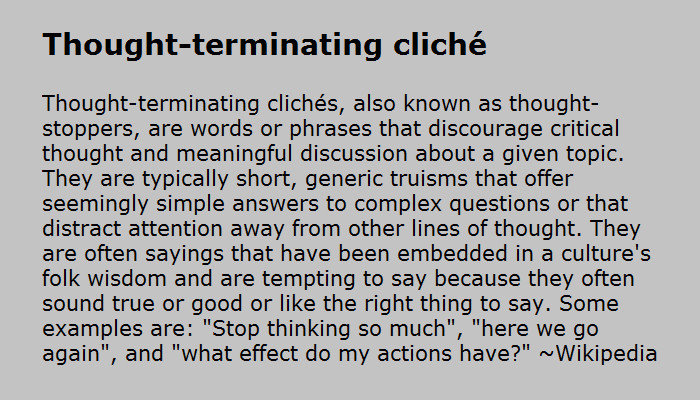
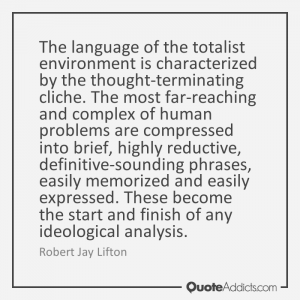
A thought-terminating cliché, also known as a discussion stopper or debate stopper, refers to a phrase or statement that is used to dismiss or halt further discussion or critical thinking on a particular topic. Here are the key points associated with thought-terminating clichés:
Halt critical thinking: Thought-terminating clichés are designed to shut down further analysis, questioning, or exploration of an idea or topic. They are often used to avoid engaging in a meaningful discussion or to discourage further examination of a complex issue.
Lack of substance: These clichés typically lack depth, originality, or substantive content. They rely on pre-packaged, simplistic phrases that are meant to sound authoritative or conclusive, but they often oversimplify or distort the topic at hand.
Emotional appeal: Thought-terminating clichés often rely on emotional appeals rather than logical or rational arguments. They may evoke strong emotions or use persuasive language to manipulate the listener’s feelings and prevent them from critically evaluating the statement being made.
Stifle dissent: These clichés are frequently used to dismiss opposing viewpoints or dissenting opinions without engaging with their substance. They can be employed as a tactic to avoid engaging in a thoughtful debate or to maintain a particular narrative without considering alternative perspectives.
Reinforce groupthink: Thought-terminating clichés can contribute to the reinforcement of groupthink, a phenomenon where individuals conform to a particular ideology or consensus without critically evaluating it. By using these clichés, group members may avoid challenging or questioning the prevailing beliefs or assumptions within the group.
Limit intellectual exploration: The use of thought-terminating clichés can hinder intellectual exploration and growth by discouraging deeper analysis and critical thinking. They create an environment where complex issues are reduced to oversimplified slogans or catchphrases, preventing a more nuanced understanding of the subject matter.
It’s important to recognize thought-terminating clichés and strive for open and meaningful discussions that encourage critical thinking, inquiry, and the exploration of diverse perspectives.
A discussion stopper, also known as a debate stopper or a thought-terminating cliché, refers to a phrase or statement used to halt a conversation or debate without addressing the underlying issues. These phrases can be powerful tools for shutting down discussions, as they create an illusion of resolution without actually resolving the disagreement.
An invalid argument, on the other hand, refers to a line of reasoning that is flawed or illogical. Invalid arguments may be intentionally deceptive or may simply be the result of faulty reasoning. Common types of invalid arguments include ad hominem attacks, circular reasoning, and appeals to emotion.
A thought-terminating cliché can also be an example of an invalid argument if it is used to deflect attention away from a legitimate point of discussion or to avoid addressing an uncomfortable truth. For example, saying “that’s just the way things are” can be a thought-terminating cliché that is used to shut down a conversation about systemic injustice.
Overall, a discussion stopper or thought-terminating cliché is not a valid or constructive way to engage in a conversation or debate, as it does not address the underlying issues or allow for meaningful dialogue.
A discussion stopper, also known as a debate stopper or thought-terminating cliché, refers to a statement or phrase that is used to end a conversation or argument without addressing the actual points being made. It is a type of invalid argument that is often used to shut down discussion by dismissing the opposing point of view or by appealing to emotions instead of facts.
Some common examples of discussion stoppers include:
- “That’s just the way it is.”
- “Agree to disagree.”
- “It’s always been this way.”
- “You just don’t understand.”
- “It’s not up for debate.”
These types of phrases can be frustrating for those engaging in a discussion or debate because they do not offer any real counterarguments or insights into the topic at hand. Instead, they simply shut down the conversation, often leaving both parties feeling unsatisfied.
It’s important to recognize when a discussion stopper is being used and to try to steer the conversation back to the actual topic at hand. This can be done by asking clarifying questions or by bringing the conversation back to specific points that were made earlier. By doing so, it’s possible to continue the discussion in a productive manner rather than allowing it to be shut down by a thought-terminating cliché.
A discussion stopper or debate stopper, also known as a thought-terminating cliché, is a term or phrase that is used to end a discussion or debate rather than to contribute to it. It is typically a statement that is meant to dismiss an argument without actually addressing the merits of the argument. These statements are often repeated in response to any opposing views and may become a kind of reflex or mantra for those who use them.
Examples of discussion stoppers include phrases like “It is what it is,” “That’s just your opinion,” or “It’s always been done this way.” These phrases are often used to shut down discussions rather than to engage with them. They imply that there is no point in continuing the discussion because the other person’s point of view is not worth considering.
In short, a discussion stopper is an invalid argument because it does not contribute anything to the discussion and instead seeks to end it without addressing the substance of the argument. It is important to avoid using these types of statements and to instead engage in constructive dialogue to reach a deeper understanding of the issues at hand.
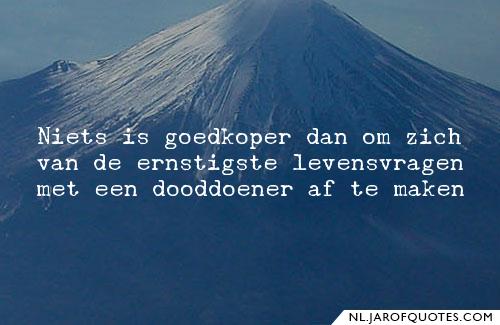
De discussie werd beëindigd met de dooddoener dat de waarheid wel in het midden zal liggen.
A thought-terminating cliche is a phrase often repeated within society that quells social dissent and questioning.
Examples
“All’s well that ends well.”
“No news is good news.”
“If at first you don’t suceed, try, try, again.”
“Nice guys finish last.”
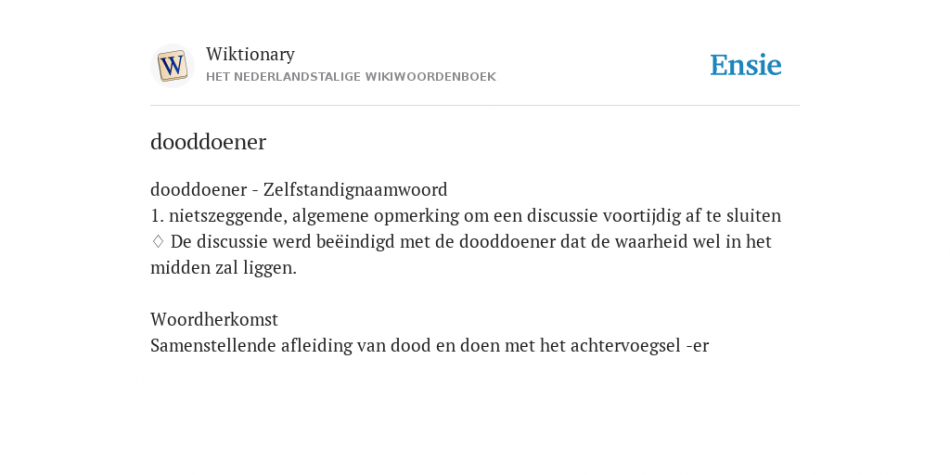
De discussie werd beëindigd met de dooddoener dat de waarheid wel in het midden zal liggen.